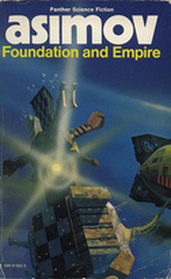
This is the second book in Asimov's Foundation trilogy.
The first book saw Hari Seldon use the new field of psycho-history to predict the fall of the dying empire and to map out the future of humanity and establish a new foundation at the edge of the galaxy. By creating a society under the right conditions and by predicting the course of mankind's future, Seldon was able to steer humanity out of barbarism and into a new civilisation. Seldon died but many came after him to steer the Foundation through each Seldon crisis, a crisis that threatens the Foundation but which Seldon has predicted and preemptively counteracted.
So the second book tells the story of how the current inhabitants of the Foundation, 300 years after Seldon, are continuing to try and survive based on Seldon's principles. But they are threatened by a new and unknown enemy called the Mule, a mysterious man who is slowly taking over the galaxy by forces unknown.
I loved the first book. I thought it was a really clever idea and that the characters used to act it out were some of the best I'd ever read. So I was dubious coming to the second book because on the one hand it would continue the story I had enjoyed before but would it be as good?
The answer is that it is very different and, in my opinion, doesn't measure up to
The first book saw Hari Seldon use the new field of psycho-history to predict the fall of the dying empire and to map out the future of humanity and establish a new foundation at the edge of the galaxy. By creating a society under the right conditions and by predicting the course of mankind's future, Seldon was able to steer humanity out of barbarism and into a new civilisation. Seldon died but many came after him to steer the Foundation through each Seldon crisis, a crisis that threatens the Foundation but which Seldon has predicted and preemptively counteracted.
So the second book tells the story of how the current inhabitants of the Foundation, 300 years after Seldon, are continuing to try and survive based on Seldon's principles. But they are threatened by a new and unknown enemy called the Mule, a mysterious man who is slowly taking over the galaxy by forces unknown.
I loved the first book. I thought it was a really clever idea and that the characters used to act it out were some of the best I'd ever read. So I was dubious coming to the second book because on the one hand it would continue the story I had enjoyed before but would it be as good?
The answer is that it is very different and, in my opinion, doesn't measure up to
the first. The main focus in this book is on one big threat throughout - the Mule - whereas the previous book had shown the Foundation survive over centuries. I can see why Asimov did this as another book of the same would get boring but then equally a book about one thing was a bit boring. And I thought that this time the story wasn't as clever as before. It was interesting and the ideas were new but I just wasn't as wowed by them as I was in the first.
But I suppose I shouldn't judge this book entirely in comparison to the first because they are different books. This book shows the Foundation on a more personal level, how the individuals neglected in the first survive in a Foundation that has grown complacent on the assurance of its future. While I didn't grow particularly attached to any of them, I did find their stories interesting.
So if you liked the first one you will like this one, but not as much. However, you can see how necessary it is for introducing new ideas that will drive the series on. And there are some big twists and turns in the plot to keep you on your toes, the main advantage of this one reading like an adventure story rather than like a book of ideas like the last one.
I would recommend not just this book but the series as a whole to anyone. Science fiction isn't all monsters and aliens and this series shows that by having a very human cast put under extreme circumstances (in space).
But I suppose I shouldn't judge this book entirely in comparison to the first because they are different books. This book shows the Foundation on a more personal level, how the individuals neglected in the first survive in a Foundation that has grown complacent on the assurance of its future. While I didn't grow particularly attached to any of them, I did find their stories interesting.
So if you liked the first one you will like this one, but not as much. However, you can see how necessary it is for introducing new ideas that will drive the series on. And there are some big twists and turns in the plot to keep you on your toes, the main advantage of this one reading like an adventure story rather than like a book of ideas like the last one.
I would recommend not just this book but the series as a whole to anyone. Science fiction isn't all monsters and aliens and this series shows that by having a very human cast put under extreme circumstances (in space).
 RSS Feed
RSS Feed